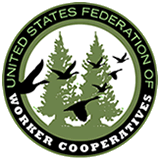This article has multiple issues. Please help improve it or discuss these issues on the talk page . (Learn how and when to remove these messages)
|
 | |
| Company type | Cooperative federation |
|---|---|
| Industry | Worker-owned enterprises |
| Founded | 2004 |
| Headquarters | , |
Area served | United States |
Key people | Melissa Hoover, Executive Director [1] |
| Revenue | 1,799,715 United States dollar (2022) |
| Total assets | 1,296,463 United States dollar (2022) |
| Members | Worker cooperatives, co-operative developers, worker co-operative regional networks and individuals |
| Website | www |
The United States Federation of Worker Cooperatives (USFWC) is the national grassroots membership organization representing worker cooperatives and democratic workplaces. Its mission is to build a thriving ecosystem for worker-owned and controlled businesses and to empower their cooperative leaders to power movements for racial justice and economic democracy. [2] USFWC was founded in 2004 by few core co-op members in collaboration with co-op developers, scholars, community organizers, and supporters from the wider co-op sector. [2]
Contents
The Federation was sponsored by The Cooperative Foundation in addition to other cooperative support organizations. It was created partly in response to growing regional organizing among United States worker cooperatives and to foster the sharing of information and resources between national gatherings. [3] [4]